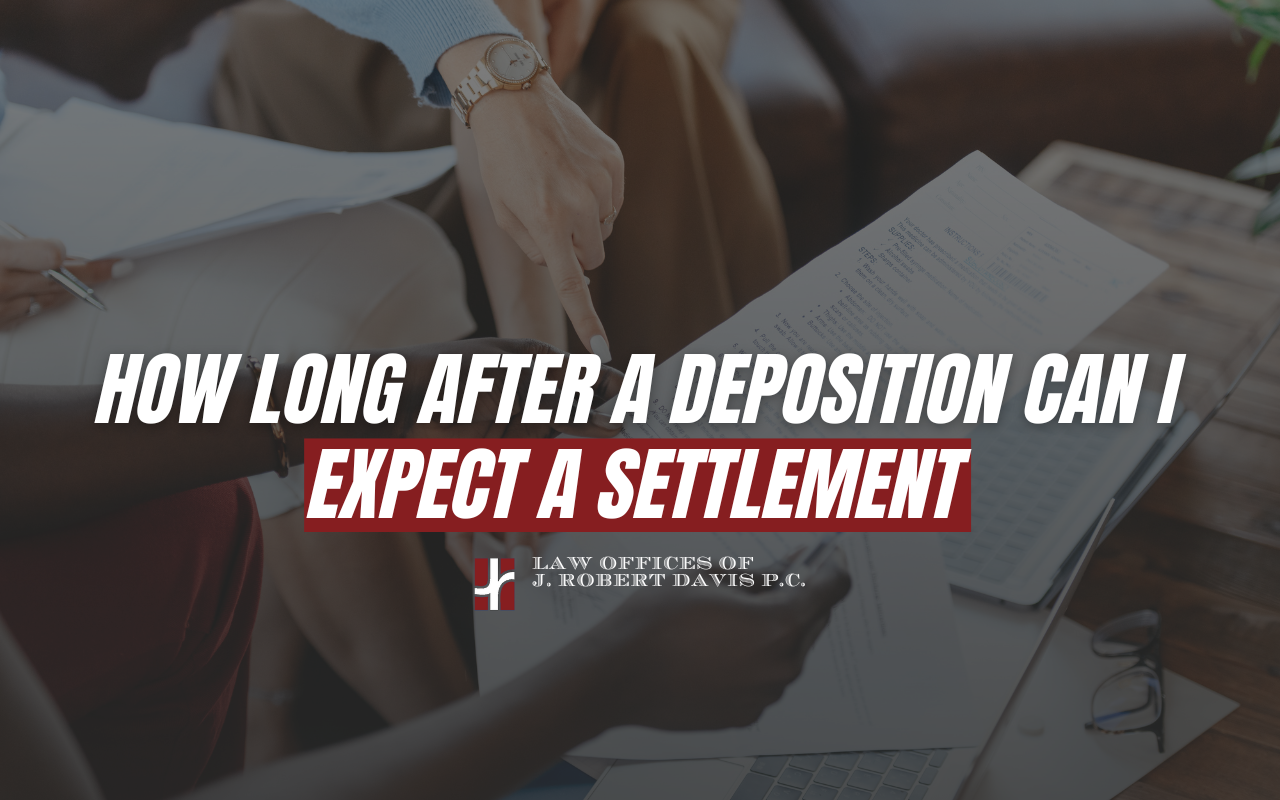
How Long After a Deposition Can I Expect a Settlement in Texas?
If you’ve recently given a deposition for a personal injury case in Texas, you might be wondering, “How long after a deposition can I expect a settlement in Texas?” This is a common question our clients at the Law Offices of J. Robert Davis, P.C., often ask. The answer, however, can vary significantly depending on several factors. In this comprehensive guide, we’ll break down the timeline and factors involved in reaching a settlement after a deposition.
Understanding the Legal Process
To understand the timeframe for a settlement, it’s essential to grasp the overall legal process in a personal injury case.
- Initial Consultation: The process begins when you consult with a personal injury lawyer. During this consultation, your attorney will evaluate the merits of your case and discuss potential strategies.
- Filing the Lawsuit: If you decide to proceed, your attorney will file a formal complaint (lawsuit) against the defendant. This document outlines the allegations and the compensation you seek.
- Discovery Phase: Once the lawsuit is filed, the case enters the discovery phase. During discovery, both parties exchange information, documents, and evidence. This phase also includes depositions, where witnesses and involved parties provide sworn statements under oath.
- The Deposition: A deposition can be a crucial turning point in a personal injury case. During the deposition, attorneys for both sides ask questions to gather detailed information. Your testimony is recorded, and it helps both sides assess the strength of the case.
- Reviewing Deposition Transcripts: After the deposition, it can take several weeks for the court reporter to prepare and deliver the official transcript. Your attorney will review this transcript to assess how well your testimony supports your case.
- Negotiation Phase: Armed with the deposition transcript, both parties often enter into settlement negotiations. Settlement discussions can begin shortly after the deposition or may take weeks or even months, depending on the complexity of the case and the willingness of the parties to negotiate.
- Mediation: If initial settlement negotiations are not successful, mediation might be the next step. Mediation involves a neutral third party (the mediator) who helps facilitate discussions between both sides. While mediation can expedite the settlement process, it also adds additional time to the overall timeline.
- Settlement Agreement: Once both parties agree on a settlement amount, a formal settlement agreement is drafted. This document outlines the terms of the settlement and releases the defendant from further liability. It might take several days to weeks to finalize and get all necessary signatures.
Factors Affecting Settlement Timelines
Several factors can influence how long it takes to reach a settlement after a deposition:
- Complexity of the Case: Cases involving multiple parties, significant damages, or complex legal issues can prolong the negotiation process. Both sides need ample time to review all evidence, including deposition transcripts.
- Willingness to Settle: The readiness of both parties to settle plays a significant role. If the defendant’s insurance company is willing to settle quickly, it can expedite the process. However, if either party is determined to take the case to trial, negotiations can stall.
- Court Schedules: The availability of court dates for mediation or trial can impact the timeline. Courts often have busy schedules, and finding mutually convenient dates for all parties involved can lead to delays.
- Legal Strategies: Attorneys may employ various strategies to strengthen their position, which can affect the timeline. For instance, they might file motions or request additional depositions, adding to the overall duration.
- Insurance Company Tactics: Insurance companies sometimes employ delay tactics hoping to pressure plaintiffs into accepting lower settlements. Experienced attorneys, like those at the Law Offices of J. Robert Davis, P.C., can counter these tactics effectively.
Typical Settlement Timeline
While every case is unique, here’s a general timeline to give you an idea of what to expect:
- Days to Weeks After Deposition: Initial review of deposition transcripts by both parties.
- Preliminary settlement negotiations may begin.
- 1 to 3 Months After Deposition: Continued negotiations. Possible mediation sessions.
- 3 to 6+ Months After Deposition: Settlement reached and formal agreement signed. If no settlement, preparations for trial may begin.
Contact Our Texas Personal Injury Law Firm
In summary, the timeline for reaching a settlement after a deposition in Texas can vary widely. It’s influenced by the complexity of the case, the willingness of the parties to settle, court schedules, legal strategies, and the tactics employed by insurance companies. On average, it can take anywhere from a few weeks to several months to reach a settlement agreement after a deposition.
At the Law Offices of J. Robert Davis, P.C., we understand the importance of timely settlements to our clients. We are committed to providing expert guidance and support throughout the entire legal process. If you have any questions or need personalized assistance, don’t hesitate to contact us.

